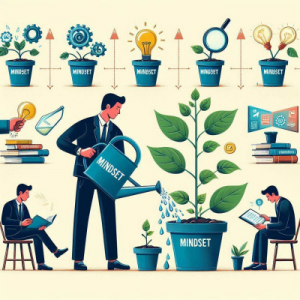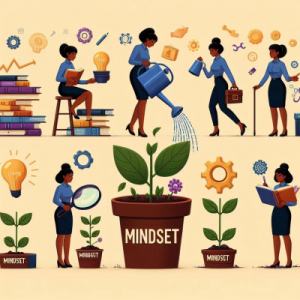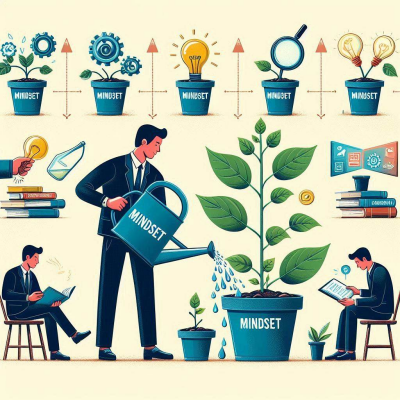You may be surprised to learn that individuals with a growth mindset are 47% more likely to say they are fulfilled in their work. Developing this mindset can enhance how you approach challenges and opportunities.
By understanding the key principles behind fostering a growth mindset, you can unleash your potential for growth and success in both your personal and professional life. So, how can you cultivate this mindset and take charge of your journey towards continuous improvement?
Understanding Growth Mindset
 To understand the concept of a growth mindset, it’s essential to recognize the belief that your abilities can be developed through dedication and hard work. A key aspect of this mindset shift is understanding that your intelligence and talents aren’t fixed traits but can be cultivated over time through effort and perseverance. This personal development philosophy emphasizes the importance of embracing challenges and viewing failures as opportunities for growth rather than setbacks.
To understand the concept of a growth mindset, it’s essential to recognize the belief that your abilities can be developed through dedication and hard work. A key aspect of this mindset shift is understanding that your intelligence and talents aren’t fixed traits but can be cultivated over time through effort and perseverance. This personal development philosophy emphasizes the importance of embracing challenges and viewing failures as opportunities for growth rather than setbacks.
When you adopt a success mindset, you open yourself up to a world of self-improvement possibilities. Instead of seeing your skills as static, you begin to view them as malleable qualities that can be enhanced through practice and learning. This shift in perspective can have a profound impact on how you approach various aspects of your life, from work and relationships to personal goals and aspirations.
Research on the benefits of a growth mindset suggests that individuals who believe in their ability to develop their skills are more likely to achieve success in the long run. By fostering a mindset focused on continuous improvement and resilience, you position yourself for greater achievements and fulfillment. Embracing the idea that your potential isn’t predetermined but can be shaped through effort can lead to increased motivation, productivity, and overall well-being.
Embracing Challenges and Setbacks
Embracing challenges and setbacks is essential for developing a growth mindset and fostering personal growth and resilience. When you face obstacles head-on, you’re actively engaging in the process of overcoming obstacles, which is vital for your development.
Research shows that individuals who view challenges as opportunities for growth have a greater sense of resilience and are better equipped to handle setbacks.
Overcoming obstacles isn’t just about conquering the specific challenge at hand; it’s also about building the mental fortitude to navigate future difficulties. By embracing challenges, you’re training your mind to approach problems with a solution-oriented mindset, thereby fostering resilience.
This resilience acts as a shield against the negative effects of setbacks, allowing you to bounce back stronger each time.
It’s important to remember that setbacks aren’t indicative of failure but rather opportunities for growth. When faced with a setback, take a moment to reflect on what you can learn from the experience.
This reflective practice not only helps you glean valuable insights but also reinforces your ability to adapt and grow in the face of adversity.
Incorporating a mindset that embraces challenges and setbacks is a powerful tool in your personal growth journey. By actively seeking out challenges and viewing setbacks as stepping stones rather than roadblocks, you’re nurturing a mindset that’s resilient, adaptable, and primed for continual growth.
Cultivating a Positive Perspective
Facing challenges and setbacks with a positive perspective can greatly impact your mindset and personal growth journey. One powerful way to cultivate this positive outlook is through the practice of positive affirmations. By repeatedly affirming your strengths and capabilities, you reinforce a belief in your ability to overcome obstacles.
Additionally, incorporating daily gratitude into your routine can shift your focus towards the positive aspects of your life, helping you navigate challenges with a more optimistic mindset.
Mindfulness practice is another effective tool in fostering a positive perspective. Being present in the moment and observing your thoughts without judgment can help you develop resilience in the face of difficulties. It allows you to approach challenges with a clear and calm mind, enabling you to make more rational decisions and find constructive solutions.
In conjunction with mindfulness, establishing self-care routines is essential for maintaining a positive outlook. Taking care of your physical, emotional, and mental well-being through activities that rejuvenate you can enhance your overall resilience and ability to bounce back from setbacks.
Learning From Feedback and Criticism
By embracing a growth mindset, individuals can leverage feedback and criticism as valuable tools for personal development and improvement. Receiving feedback, whether positive or constructive criticism, is essential for growth. It provides insights into areas where you excel and where there’s room for improvement.
When faced with criticism, it’s important to engage in self-reflection. Take a step back and assess the feedback objectively. Ask yourself why this feedback was given and how you can use it to enhance your skills or behaviors.
Constructive criticism, although sometimes difficult to hear, can be a catalyst for personal development. It highlights areas that may have gone unnoticed and offers a chance for growth. Embrace feedback as a means to propel yourself forward rather than a setback. Remember, growth often comes from stepping out of your comfort zone and challenging yourself.
Engaging in self-reflection after receiving feedback allows you to internalize the information and apply it to your personal development journey. It’s about taking the feedback constructively and using it to set new goals for improvement.
Setting Goals for Growth
Reflecting on feedback received and the insights gained, it’s now essential to establish clear and measurable goals that align with your aspirations for personal growth in the upcoming year. Setting goals for growth is a pivotal step in fostering a growth mindset that propels you towards success.
To enhance goal achievement and personal development, it’s vital to outline SMART goals – Specific, Measurable, Achievable, Relevant, and Time-bound.
When setting your goals, consider not only the end result but also the journey. Personal development is a continuous process that requires dedication and perseverance. By setting specific milestones along the way, you can track your progress and stay motivated.
Research shows that individuals who set specific goals are more likely to achieve them than those with vague aspirations.
Moreover, when establishing your goals, make sure they’re aligned with your values and long-term objectives. Your goals should challenge you to grow and push beyond your comfort zone while still being attainable.
Remember that setbacks are a natural part of the growth process. Embrace failures as opportunities to learn and adjust your course towards achieving your goals.
Building Resilience and Persistence
 To cultivate a growth mindset effectively, it’s essential to focus on building resilience and persistence in the face of challenges. Overcoming obstacles is an integral part of personal growth and development. When faced with setbacks, it’s important to view them as opportunities for learning and growth rather than insurmountable barriers. Research shows that individuals who demonstrate resilience are better equipped to navigate life’s challenges and bounce back from adversity.
To cultivate a growth mindset effectively, it’s essential to focus on building resilience and persistence in the face of challenges. Overcoming obstacles is an integral part of personal growth and development. When faced with setbacks, it’s important to view them as opportunities for learning and growth rather than insurmountable barriers. Research shows that individuals who demonstrate resilience are better equipped to navigate life’s challenges and bounce back from adversity.
Building strength, both mentally and emotionally, is a key component of developing resilience. By actively practicing self-care, fostering positive relationships, and maintaining a growth-oriented mindset, you can enhance your ability to persevere through difficult times. Studies have indicated that individuals with a strong sense of resilience tend to have higher levels of overall well-being and satisfaction with life.
Persistence is another crucial factor in cultivating a growth mindset. It involves staying committed to your goals, even when faced with obstacles or failures. Research has shown that individuals who exhibit high levels of persistence are more likely to achieve long-term success and personal growth.
Conclusion
As you navigate the journey of personal and professional growth, remember that embracing challenges and setbacks is like tending to a garden – with patience and perseverance, you’ll see your efforts bloom into success.
Keep learning from feedback, setting goals, and maintaining a positive perspective to nurture your growth mindset. Your mindset is the soil in which your potential grows, so tend to it with care and watch yourself flourish.








